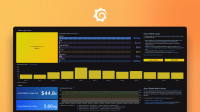Caution
Grafana Alloy is the new name for our distribution of the OTel collector. Grafana Agent has been deprecated and is in Long-Term Support (LTS) through October 31, 2025. Grafana Agent will reach an End-of-Life (EOL) on November 1, 2025. Read more about why we recommend migrating to Grafana Alloy.
Important: This documentation is about an older version. It's relevant only to the release noted, many of the features and functions have been updated or replaced. Please view the current version.
logging block
logging is an optional configuration block used to customize how Grafana
Agent produces log messages. logging is specified without a label and can
only be provided once per configuration file.
Example
logging {
level = "info"
format = "logfmt"
}Arguments
The following arguments are supported:
Log level
The following strings are recognized as valid log levels:
"error": Only write logs at the error level."warn": Only write logs at the warn level or above."info": Only write logs at info level or above."debug": Write all logs, including debug level logs.
Log format
The following strings are recognized as valid log line formats:
"logfmt": Write logs as logfmt lines."json": Write logs as JSON objects.
Log location
Grafana Agent writes all logs to stderr.
When running Grafana Agent as a systemd service, view logs written to stderr
through journald.
When running Grafana Agent as a container, view logs written to stderr
through docker logs or kubectl logs, depending on whether Docker or
Kubernetes was used for deploying the agent.
When running Grafana Agent as a Windows service, logs are instead written as event logs; view logs through Event Viewer.
In other cases, redirect stderr of the Grafana Agent process to a file for
logs to persist on disk.




